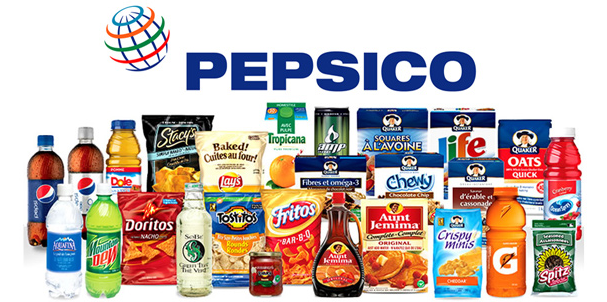
PepsiCo
usinfo | 2013-05-17 15:10

PepsiCo Inc. is an American multinational food and beverage corporation headquartered in Purchase, New York, United States, with interests in the manufacturing, marketing and distribution of grain-based snack foods, beverages, and other products. PepsiCo was formed in 1965 with the merger of the Pepsi-Cola Company and Frito-Lay, Inc. PepsiCo has since expanded from its namesake product Pepsi to a broader range of food and beverage brands, the largest of which include an acquisition of Tropicana in 1998 and a merger with Quaker Oats in 2001—which added the Gatorade brand to its portfolio.
As of January 2012, 22 of PepsiCo's product lines generated retail sales of more than $1 billion each,and the company's products were distributed across more than 200 countries, resulting in annual net revenues of $43.3 billion. Based on net revenue, PepsiCo is the second largest food & beverage business in the world. Within North America, PepsiCo is ranked (by net revenue) as the largest food and beverage business.
Indra Krishnamurthy Nooyi has been the chief executive of PepsiCo since 2006, and the company employed approximately 297,000 people worldwide as of 2011. The company's beverage distribution and bottling is conducted by PepsiCo as well as by licensed bottlers in certain regions. PepsiCo is a SIC 2080 (beverage) company.
Product nutrition
Product diversity
From its founding in 1965 until the early 1990s, the majority of PepsiCo's product line consisted of carbonated soft drinks and convenience snacks.
PepsiCo broadened its product line substantially throughout the 1990s and 2000s with the acquisition and development of what its CEO deemed as "good-for-you" products, including Quaker Oats, Naked Juice and Tropicana orange juice. Sales of such healthier-oriented PepsiCo brands totaled $10 billion in 2009, representing 18 percent of the company's total revenue in that year. This movement into a broader, healthier product range has been moderately well received by nutrition advocates; though commentators in this field have also suggested that PepsiCo market its healthier items as aggressively as less-healthy core products.
In response to shifting consumer preferences and in part due to increasing governmental regulation, PepsiCo in 2010 indicated its intention to grow this segment of its business, forecasting that sales of fruit, vegetable, whole grain and fiber-based products will amount to $30 billion by 2020. To meet this intended target, the company has said that it plans to acquire additional health-oriented brands while also making changes to the composition of existing products that it sells.
Ingredient changes
Public health advocates have suggested that there may be a link between the ingredient makeup of PepsiCo's core snack and carbonated soft drink products and rising rates of health conditions such as obesity and diabetes. The company aligns with personal responsibility advocates, who assert that food and beverages with higher proportions of sugar or salt content are fit for consumption in moderation by individuals who also exercise on a regular basis.
Changes to the composition of its products with nutrition in mind have involved reducing fat content, moving away from trans-fats, and producing products in calorie-specific serving sizes to discourage overconsumption, among other changes. One of the earlier ingredient changes involved sugar and caloric reduction, with the introduction of Diet Pepsi in 1964 and Pepsi Max in 1993 – both of which are variants of their full-calorie counterpart, Pepsi. More recent changes have consisted of saturated fat reduction, which Frito-Lay reduced by 50% in Lay's and Ruffles potato chips in the U.S. between 2006 and 2009.Also in 2009, PepsiCo's Tropicana brand introduced a new variation of orange juice (Trop50) sweetened in part by the plant Stevia, which reduced calories by half.Since 2007, the company also made available lower-calorie variants of Gatorade, which it calls "G2".
Distribution to children
As public perception placed additional scrutiny on the marketing and distribution of carbonated soft drinks to children, PepsiCo announced in 2010 that by 2012, it will remove beverages with higher sugar content from primary and secondary schools worldwide.It also, under voluntary guidelines adopted in 2006, replaced "full-calorie" beverages in U.S. schools with "lower-calorie" alternatives, leading to a 95 percent reduction in the 2009 sales of full-calorie variants in these schools in comparison to the sales recorded in 2004. In 2008, in accordance with guidelines adopted by the International Council of Beverages Associations, PepsiCo eliminated the advertising and marketing of products that do not meet its nutrition standards, to children under the age of 12.
In 2010, First Lady Michelle Obama initiated a campaign to end childhood obesity (titled Let's Move!), in which she sought to encourage healthier food options in public schools, improved food nutrition labeling and increased physical activity for children. In response to this initiative, PepsiCo, along with food manufacturers Campbell Soup, Coca-Cola, General Mills and others in an alliance referred to as the "Healthy Weight Commitment Foundation", announced in 2010 that the companies will collectively cut one trillion calories from their products sold by the end of 2012 and 1.5 trillion calories by the end of 2015
Share this page



















